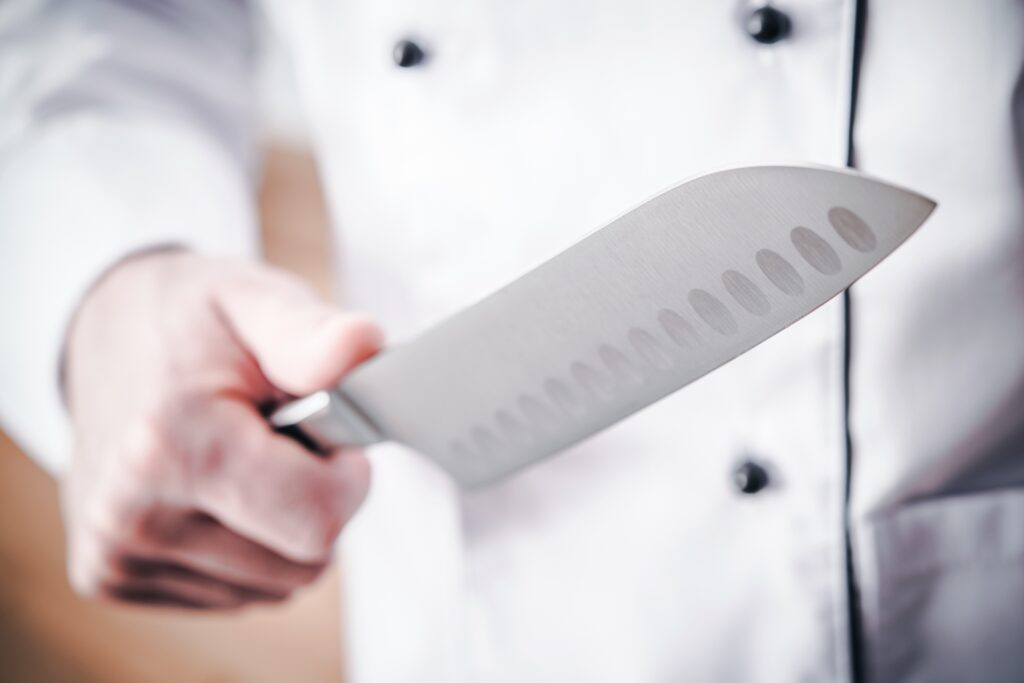
Knife skills are at the heart of cooking, whether whipping a quick dinner or preparing a gourmet meal. They improve efficiency, ensure uniform cooking, and elevate the visual appeal of your dishes. Chef Abdul, a seasoned culinary expert and mentor at Tandooriwala, emphasises, “Good knife skills aren’t just about cutting—they’re about precision, safety, and artistry.”
Let’s explore the essential knife skills every chef must know, from gripping the blade to mastering advanced techniques.
A proper grip is critical for maintaining control, precision, and safety.
The Pinch Grip
This is the preferred grip for professional chefs:
The Handle Grip
A beginner-friendly option:
Chef Abdul’s Tip: “Keep your wrist loose and use a rocking motion for slicing—it’s less tiring and improves accuracy.”
A stable cutting board is as important as the knife itself:
Mastering basic cuts ensures even cooking and a polished presentation. Here are the most essential ones:
Thin matchstick-like cuts (⅛ x ⅛ x 2 inches) ideal for salads or stir-fries.
Thicker sticks (¼ x ¼ x 2-3 inches), perfect for fries or vegetable crudités.
Fine chopping is commonly used for garlic, herbs, or shallots.
Chef Abdul’s Tip: “Uniform cuts aren’t just for aesthetics—they ensure even cooking, which is essential for professional-quality results.”
These techniques are the foundation of efficient and safe cutting.
Rocking Motion
Use the knife’s tip as a pivot while rocking the blade back and forth. This is ideal for slicing herbs or vegetables smoothly.
Claw Grip
Curl your fingers inward on your non-dominant hand, creating a “claw” to guide the knife and protect your fingertips.
Chopping Motion
Lift the knife and bring it straight down for deliberate, firm cuts. These are often used for hard vegetables like carrots.
Chef Abdul’s Tip: “A steady rhythm and consistent pressure help maintain control and precision.”
A well-maintained knife is safer and more effective. Follow these tips to keep your knives in top shape:
Chef Abdul’s Tip: “A dull knife is more dangerous than a sharp one because it requires more force, increasing the risk of slipping.”
Once you’ve mastered the basics, these advanced techniques will elevate your skills:
Remove meat or fish from the bone with precision using a filleting knife.
Slice roasted meats like chicken or turkey into even, elegant portions.
Cleanly cut citrus fruits into pith-free segments, perfect for garnishes or salads.
Chef Abdul’s Insight: “Specialized techniques like carving and filleting showcase finesse and add a professional touch to your dishes.”
Each knife serves a specific purpose. Familiarize yourself with these essentials:
Chef Abdul’s Tip: “Invest in high-quality knives—they’re a long-term investment that improves your efficiency and enjoyment in the kitchen.”
Pro Tips for Mastering Knife Skills
“Knife skills are the foundation of cooking,” Chef Abdul explains. “At Tandooriwala, we teach our chefs that mastering these techniques is the key to creating exceptional dishes.”
Strong knife skills will elevate your cooking, whether dicing vegetables for a curry, carving a roast, or slicing fruit for dessert. Start with the basics, practice regularly, and invest in quality tools. Soon, you’ll work with the precision and confidence of a professional chef.
What’s your go-to knife skill? Share your experiences and tips in the comments below!
Chef Abdul © Copyright 2024. All rights reserved.